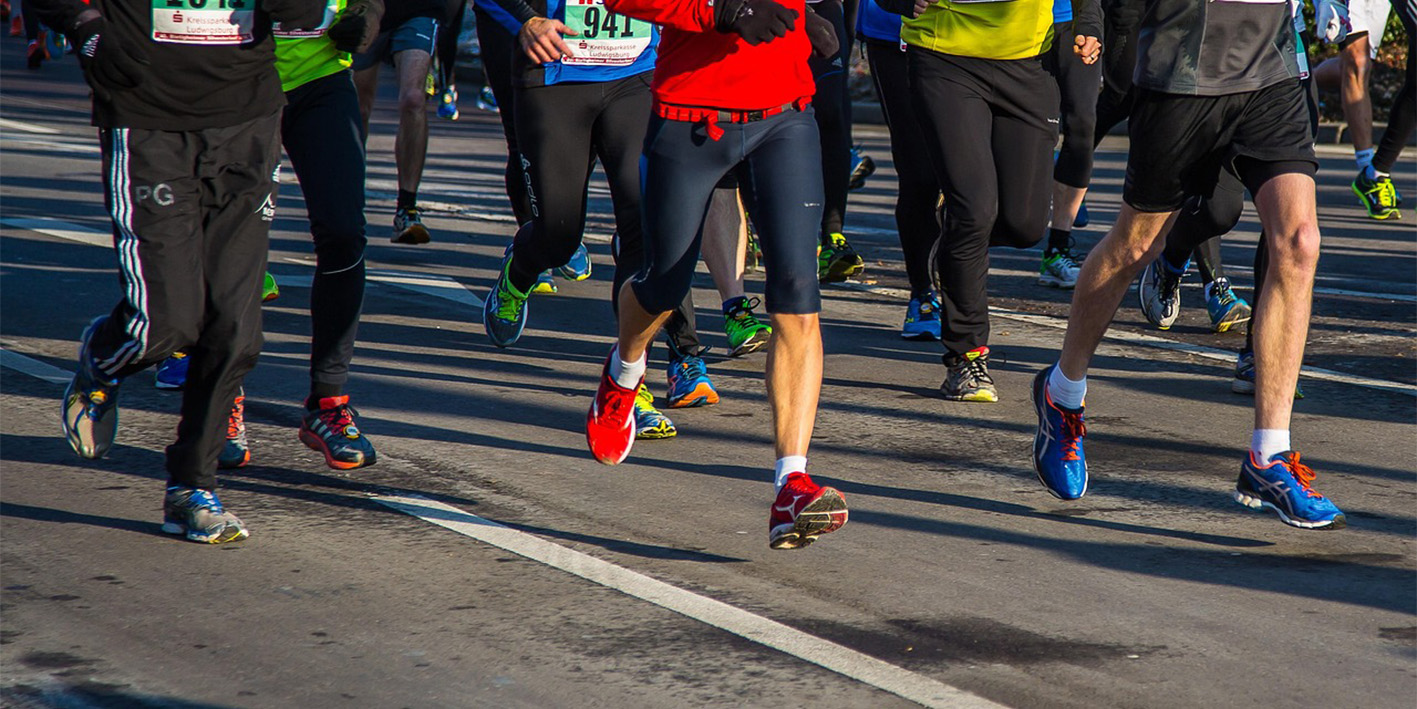“If it were easy, everybody would do it”: Meditations on marathon training

In this blog Kumar Jayantilal aims to draw parallels between long-distance running and postgraduate study.
Here I am, less than a week to go until the London Marathon, 26.2 miles of unadulterated pleasure through pain. I would be lying, however, if I told you that I was equipped. My training has been punctuated by a handful of half-hearted ‘long runs’ interspersed with some vigorous running on the treadmill. Physically and mentally, therefore, I am destined to struggle. That said, a marathon, like any self-eliminating sporting endeavour, reconciles the body and mind, drawing upon the spirit, a way of be(liev)ing that goes beyond the physical. So, while I have pushed myself by painfully pounding my paws on the pavement, it is the heart that is seeing me through to the finishing line – perhaps the same way that undergraduates are trying to complete their final assignments and achieve graduation, as I type this. Having devoted my previous two blogs to the academic lecturers, therefore, the following blog is strictly for the students. In the spirit of What I Talk About When I Talk About Running by Haruki Murakami, this entry is an attempt to illuminate some of my meditations from marathon training. More specifically, I aim to draw parallels between long-distance running and postgraduate study. First, however, some context.
After two failed attempts at navigating the brutal ballot system, where the chances of being allocated a place for the marathon are infinitesimally low, I was successfully selected to run in the TCS London Marathon 2025. My motivations, upon reflection, were threefold. First, I wanted to fundraise money for Shelter UK, a housing and homelessness charity. Second, the organisers have assembled the most competitive (and arguably the best) elite runners in the marathon’s 45-year history: Ethiopia’s Kenenisa Bekele, an exemplification of seamless running, and one of the most decorated long-distance runners, aims to be there. Third, I want to undertake a venture that involved long periods of solitude yet enabled a degree of self-elimination through brutality. However, rather than ‘forgetting myself’, I only became closer to myself and something Higher. The marathon comes at a time when I was becoming increasingly disconnected with my postgraduate degree, a Professional Doctorate in Education (EdD). Despite years of hard work and progress, and a fortuitous turn of events in life, I had neither the capacity to reconcile the demands of teaching and research, or the sustained interest in a research topic that I had grown cynical towards. Yet, as the blog explores, it was running, or more specifically the resemblances between running and a doctorate, that renewed my love for life and learning. So, what are the similarities?
The doctorate, like long-distance running, is a marathon not a sprint. Into my fourth year of study, and as a stickler for quantity over quality, I thought I would have graduated a long time ago. However, the doctorate requires prolonged periods of thinking (or breathing in), followed by focussed periods of writing (or breathing out). In running terms, you have to put in the miles. The miles that are accumulated should not always feel agreeable, either. In a world where everything is judged according to its comfort or capital, and where few endeavours require ‘real’ application and hard work, running is the antidote. At the end of each long run, or past the twentieth mile, every mile should feel toilsome, like the mind and body are ready to surrender. (If it were easy, everybody would do it.) Equally, with a doctorate, disorientation is inevitable, with lengthy episodes of existential angst. Yet, it is through the discomfort and uncertainty that progress occurs, when the legs and lungs become stronger, when thinking becomes rational and refined, and when the spirit becomes deeper. However, growth requires rest and replenishment in equal proportions. That said, for a doctorate student, who is working against the performative pressures of completing their work, it can be challenging to find moments of respite. Likewise, the ubiquity of metrics can result in your developing an insatiable appetite for running, with personal bests at the fore. Nevertheless, as a doctorate student and/or marathon runner, taking in sustenance at regular intervals, carefully carving out days of rest, and engaging in other interests is imperative. As a result, we approach our next run and/or study day with a renewed sense of vigour, rigour and a more open mind – a mind that is more amenable to the irreducibly beautiful transformation that tends to happen after each mammoth undertaking, whether that is a doctorate, or a marathon run.
For more information please contact the Corporate Communications Team.


/prod01/wlvacuk/media/departments/digital-content-and-communications/images-2024/Architecture-students-tree-planting.png)
/prod01/wlvacuk/media/departments/digital-content-and-communications/images-2024/250630-SciFest-1-group-photo-resized-800x450.png)
/prod01/wlvacuk/media/departments/digital-content-and-communications/submitted-news-images/Way-youth-zone-August.JPG)
/prod01/wlvacuk/media/departments/digital-content-and-communications/images-2024/Arthi-Arunasalam-teaser.jpg)
/prod01/wlvacuk/media/departments/digital-content-and-communications/submitted-news-images/Muslim-woman-playing-football.jpg)
/prod01/wlvacuk/media/departments/digital-content-and-communications/submitted-news-images/Business-School-800x450.jpg)
/prod01/wlvacuk/media/departments/digital-content-and-communications/submitted-news-images/University-of-the-Year.jpg)